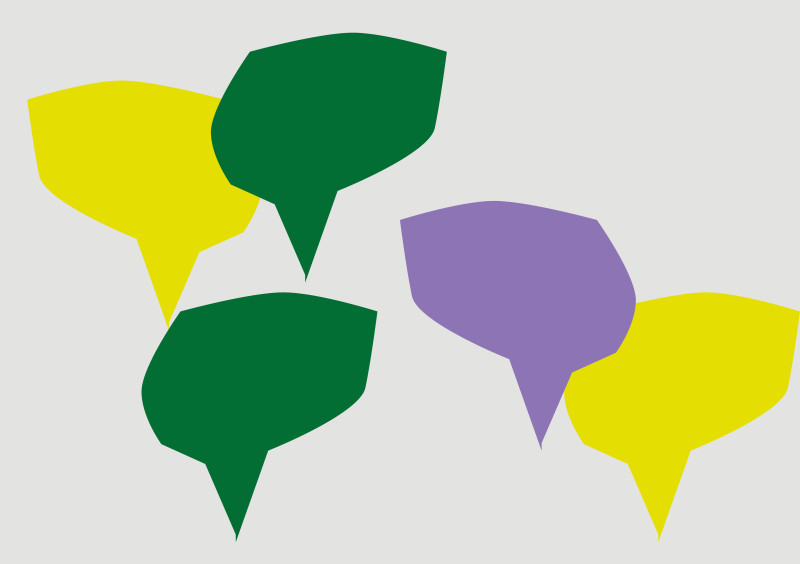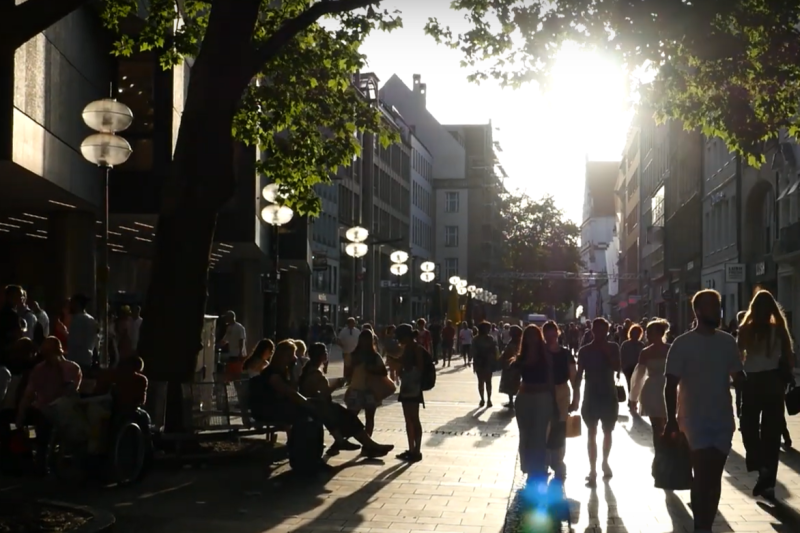Gespräche
I’m not a professional, but we are changing lives!
Es ist ein Ort der Begegnung, das kleine Büro in der Angertorstraße, auch wenn man es ihm auf den ersten Blick nicht ansieht. Es ist ein Ort der Unterstützung für queere Geflüchtete, ein Ort, wo sie psychische Beratung bekommen oder sich bei verschiedenen Angeboten mit anderen Geflüchteten vernetzen können. Seit der Gründung 1995 ist der Verein LesCommunity e.V. mit der Beratungsstelle LeTRa zu einem bedeutenden Akteur in der queeren Community Münchens geworden. Mit der Etablierung der Geflüchtetenberatung im Jahr 2011 begann LeTRa, nicht nur lesbische, bisexuelle und queere Frauen aus deutschen und migrantischen Kontexten anzusprechen, sondern sich auch mit der Unterstützung von FLINTAs mit Fluchterfahrung auseinanderzusetzen.
Neben psychologischer Beratung durch Fachkräfte, können Geflüchtete auch Gespräche führen mit Menschen, die ähnliche Erfahrungen wie sie gemacht haben. In der Peer-to-Peer Beratung geht es vor allem darum, beim Ankommen im neuen Zuhause zu unterstützen, die Münchner queere Community vorzustellen und Mut zu machen. Mut zu machen „to be free with themselves and have no fear“, wie es die Interviewpartnerin beschreibt, die sich als Peer-to-Peer Beraterin für LeTRa engagiert.
Q: Can you introduce yourself, who you are and what you do at LeTRa?
I’m a volunteer at LeTRa and also a peer-to-peer counselor. So basically, what I do at LeTRa, we help refugees – those are always our clients – that are usually new in the country and need help […]. Perhaps they have appointments with the doctors, so you pick them up, you take them to the doctor’s appointment then you take them back. We also accompany them for their hearings at the BAMF for emotional support because usually people are scared and they’re new at everything. So, they need that emotional support, someone to be next to them, to accompany them. I personally – with the help of LeTRa – organized an empowerment workshop. I see it as very important for us to stay empowered because with all the stress, people are frustrated so at the meetups we get together we talk about ourselves and tell our stories. So, people in that process have hope. That empowerment workshop I organized; it was for women. We were together, we sat, we ate, we discussed little things and people were empowered, they gained hope. There was good feedback. […] When they came in for the first time, they were all down and all that but the more we kept on talking – because when I talk to people, I’m always open to them and you know with the body language when you show people you are free, they also get free and comfortable with you […].
Q: In general, how do you feel LeTRa helps empowering people? How does this institution, this environment empower people?
To me the biggest impact LeTRa has had is, it helped people with psychological support. People come here after maybe being harassed or abused but when you come here, the counselors talk to you, one on one, so you go deep. And in that process, someone opens up and with time they will get over the past. It’s like being reborn. So, I know that it’s comfort, they’re bringing us closer [together] because the more you’re alone, the less you know what’s happening. They’re so welcoming, […] and they’re doing their best to make sure everyone is getting that psychological support. Sometimes all people need is someone to talk to them, they are stressed. It's this counselling that really had a good impact on people.
Q: The peer-to-peer counselling, it’s people that went through the same experiences becoming counselors themselves, right?
Yeah, yeah, because through our experience people learn from us and we also learn from our experiences. So, what I do is, I usually share my experiences because I’m not a professional in that, but I think […] you talk to people, and you never know how it will change their lives, so you always get feedback, “you talk to me about this and that, I’m no longer scared, I’m no longer worried about everything, I’m strong”. So, people gain the courage to stand up for themselves through just talking to them. Their voice is also important.
Q: Would you say there is a difference between the counselors that haven’t gone through those experiences and for example you as a peer counselor?
The counselors are professionals, they studied psychology, which I do not have as a peer counselor. But it‘s my purpose to share my experiences and make some impact on someone and their life. I’ve gone through this, so I’m using my past to empower someone today because usually 80%, we are facing the same problem. When I as a peer-to-peer counselor get through something […] I‘ll share it with someone, encourage them, so that they don’t feel out of place and with time things get better.
Q: Have you ever faced any difficulties during counseling?
Sometimes it’s not easy for people to open up, sometimes they’re scared. So you have to create that trust with people […]. Sometimes it’s not easy, because some are like “How can you counsel me, you’re not an expert”, so I have to convince them with experience, talk to them. Yes, I’m not a professional, but we’re changing lives. The world is not all about being professional, sometimes we get knowledge from professionals sure, and we use that to empower others, but not always.
[…]
Q: Would you say that every single part of the community that is also represented here at LeTRa is equally empowered in the overall queer community in Munich?
I can’t be sure because we are many, we are really many […] The thing with empowerment is that it comes with time. You can’t get empowered in just a day. We heal in different times, some people take years to heal, others can take months, some just need a day. Empowerment is also a process […] through the meetups we have monthly, we are changing lives. People are changing, people are getting empowered, and things don’t stay the same. People learn to be free with themselves and have no fear.
Interview & Text
Quirin Hanschmann (im August 2024)
Überarbeitung
Friederike Alexander
Portrait
“Ich wollte wirklich was bewegen!” - Arif Haidary im Portrait

Das Thema Migration liegt Arif Haidary am Herzen. Vielleicht ist er deswegen immer dort zur Stelle, wo eine helfende Hand gebraucht wird, kaum eine Demonstration ohne ihn, kaum ein Münchner Verein für Vielfalt, bei dem er nicht dabei ist. Das Portrait eines Münchners.
mehr
Gespräche
Wer gehört dazu?

Deutschland heute - Wer gehört dazu? Mögliche Antworten auf diese große Frage hat Friederike Alexander im März 2025 im Interkulturellen Magazin des BR24 gegeben. In dem Gespräch geht es darum, dass wir alle mehrere Zugehörigkeiten erleben und wie wir diese erkämpfen und aushandeln. Hören Sie rein!
mehr
Gespräche
Voices of Munich

Wie nehmen Münchner:innen Diversität und gesellschaftliche Teilhabe in München wahr? In dem Kurzfilm "Voices of Munich" kommen ganz unterschiedliche Menschen zu Wort.
mehr
Orte
Wartende Worte

Ich sitze im Raum 213 der Ausländerbehörde München. Neben mir sitzt eine Familie aus Syrien. Als Dolmetscherin ist meine Aufgabe klar: Übersetzen, was gesagt wird. Doch in diesem Raum sprechen wir nicht nur Arabisch oder Deutsch. Wir sprechen über Bleiben oder Gehen, darüber, wie das Leben der Person weitergeht.
mehr
